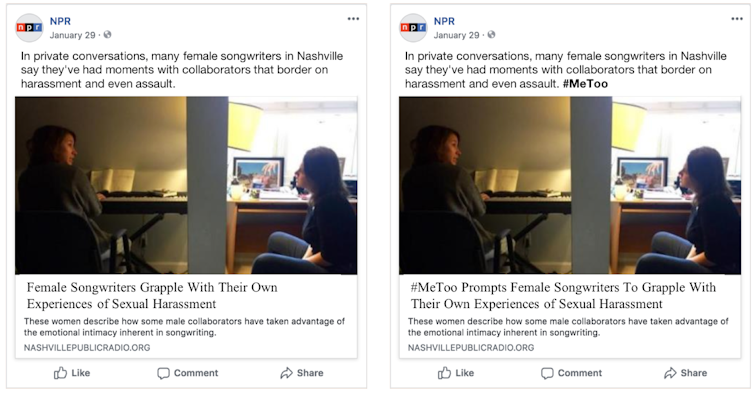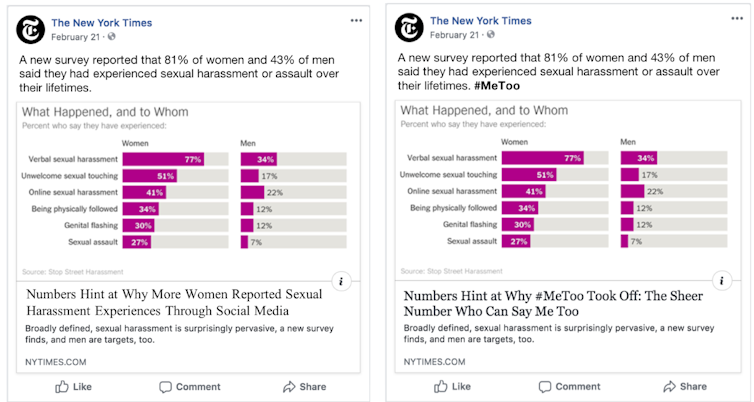
Experts in autocracies have pointed out that it is, unfortunately, easy to slip into normalizing the tyrant, hence it is important to hang on to outrage. These incidents which seem to call for the efforts of the Greek Furies (Erinyes) to come and deal with them will, I hope, help with that. As a reminder, though no one really knows how many there were supposed to be, the three names we have are Alecto, Megaera, and Tisiphone. These roughly translate as “unceasing,” “grudging,” and “vengeful destruction.”
About the last thing I am is a social media expert – well, in fact, it’s not even on the list. I am aware that a “tag” is not the same thing as a “hashtag,” and that’s about as far as my knowledge goes. But since we got into the subject of tags this week, I thought this information might be interesting – even if you never use, or at least never create, either one.
==================================================================
Political hashtags like #MeToo and #BlackLivesMatter make people less likely to believe the news

13_Phunkod/Shutterstock.com
Eugenia Ha Rim Rho, University of California, Irvine
Whether you’re a conservative or a liberal, you have most likely come across a political hashtag in an article, a tweet or a personal story shared on Facebook.
A hashtag is a functional tag widely used in search engines and social networking services that allow people to search for content that falls under the word or phrase, followed by the # sign.
First popularized by Twitter in 2009, the use of hashtags has become widespread. Nearly anything political with the intent of attracting a wide audience is now branded with a catchy hashtag. Take for example, election campaigns (#MAGA), social movements (#FreeHongKong) or calls for supporting or opposing laws (#LoveWins).
Along with activists and politicians, news companies are also using political hashtags to increase readership and to contextualize reporting in short, digestible social media posts. According to Columbia Journalism Review, such practice is a “good way to introduce a story or perspective into the mainstream news cycle” and “a way to figure out what the public wants to discuss and learn more about.”
Is this really true?
Our experiment
To find out, we conducted a controlled online experiment with 1,979 people.
We tested whether people responded differently to the presence or absence of political hashtags – particularly the most widely used #MeToo and #BlackLivesMatter – in news articles published on Facebook by major news outlets, such as The New York Times and NPR.
We randomly showed each person a news post that either contained or excluded the political hashtag. We then asked them to comment on the article and answer a few questions about it.

Eugenia Ha Rim Rho
We discovered that political hashtags are not a good way for news outlets to engage readers.
In fact, when the story included a hashtag, people perceived the news topic to be less important and were less motivated to know more about related issues.
Some readers were also inclined to view news stories with hashtags as more politically biased. This was especially true for more conservative readers, who were more likely to say a news post was extremely partisan when it included a hashtag.
Similarly, hashtags also negatively affected liberal readers. However, readers who identified themselves as “extremely liberal” did not perceive social media news content about gender and racial issues as partisan, regardless of hashtag presence.
Political moderates
What really interested me was the reaction from people in the middle. People who identified as politically moderate perceived news posts to be significantly more partisan when the posts included hashtags.
In fact, in their comments, politically moderate respondents who saw news posts with hashtags were more suspicious about the credibility of the news and focused more on the politics of the hashtag.

Eugenia Ha Rim Rho
For example in the hashtag group, politically moderate people repeatedly mention the hashtag without substantially engaging with relevant social issues:
“The #MeToo topic is turning into something like the Kardashians. You can’t look at the news without both of them headlining things. It is an important issue, but I am getting tired of seeing it over and over.”
By contrast, when hashtags were absent, readers were more likely to discuss the core ideas and values the hashtag was originally meant to represent.
“Giving a platform and voice to victims via social media is a great way to share one’s experience when one is to uncomfortable to do so publicly. Some people are too afraid to report any harassment or assaults due to being labeled a liar so I’m glad there’s a way to keep track of these instances without them going unheard.”
The language used by participants from the hashtag group in their comments was more emotionally extreme. Even those who seemed to be in favor of the hashtag movement used aggressive language to convey support of the movement and referred to those against it as “You idiots,” claiming, “there’s a reason why [#MeToo] f****-ing exists, dimwits!!”
Fostering better online discourse
These findings show that politicians, activists, news organizations and tech companies cannot take common social media practices for granted.
Even a simple practice, like branding a social topic with a catchy hashtag, can give off the impression to the public that hashtagged content, even news content published by major news companies, is hyper-partisan or untrue.
If we want to build and sustain healthy discussions online, then we need to start questioning how such practices influence the democratic health of the internet.
Using a hashtag can rapidly draw audience attention to pressing social issues. However, as our study shows, such viral momentum may be detrimental to online discussion around pressing social topics in the long run.
[ You’re smart and curious about the world. So are The Conversation’s authors and editors. You can read us daily by subscribing to our newsletter. ]![]()
Eugenia Ha Rim Rho, Ph.D. Candidate in Information and Computer Sciences, University of California, Irvine
This article is republished from The Conversation under a Creative Commons license. Read the original article.
==================================================================
Alecto, Megaera, and Tisiphone, perhaps this information is more useful to those who are “influencers” or even wannabe influencers, than to ordinary people. On the other hand, we who are the “influenced” are, I believe, assisted to make better decision when we are aware exactly how we get influenced – what those who want to influence us are hoping to achieve with various techniques. Help us stay alert.
The Furies and I will be back.
And P. S. I realize I posted at odd times last weekend, since I was traveling. But if you missed either or both of these two links, you owe it to yourself to look now:
9 Responses to “Everyday Erinyes #194”
Sorry, the comment form is closed at this time.

Everyone has implicit biases…apparently hashtags themselves are subject to such biases since their emergence
Very interesting JD. It’s not a problem for me, because I never use FAKEbook and virtually never use twitter. You’ won’t see hashtags in my articles, unless inserted from another article.
The best advice I can give is not to use them in articles. Use them in Twitter, but don’t use them (or anything else) on FAKEbook.
Looking at the examples they used, and reading their sample comments, I think what is going on with these hashtags is the same thing that is going on whenever one mentions, with or without a hashtag, “white privilege” (white entitlement, white fragility.) And I think that thing that is going on is guilt. The good news is that, somewhere deep down, the person still has a conscience. The bad news is that it’s buried mighty deep.
I never really put a second thought about it, when I see (or not see) a hashtag re: a subject.
I followed what was going on in Hong Kong, and saw the hashtag, and clicked on it to see what it was about.
I think that it’s a person’s preference, imho.. whether to read, or not read. Sometimes I do click on a #, other times I’ll pass it by.
Interesting subject, Joanne.
Grab life, love the little cub finding out how daddy will feel today…all great pics!!
Oh, and Randy. Such a sweetheart. Love his videos.
Thanks, Joanne (and Furies) for post.
I’m pretty much in agreement w/ these finding. My gut response when I encounter a hashtag is that the author is using it to enhance his/her agenda.
(But I can’t say I sometimes do go take a look-see.)
I’m not on Facebook or use Twitter in any way, so I can’t look at or compare articles put on Facebook by news outlets who use hashtags with those who do not, but I wondered if they would put their hashtags in bold right in the title section. It really is very in-your-face, you can’t possibly ignore it when reading just the title.
To a newbie like me, it signals that the article is either written by someone from the hashtag community, or at least on behalf of that community, and I would dismiss it as ‘not independent news’ but an opinion article and probably only peruse it, even if the hashtags were clearly ‘liberal’ as #metoo. I would think news outlets would be sensitive to that and perhaps put their hashtags in a less prominent place, perhaps with their tags? 😉
If they in fact put their hashtags in at the top as the research suggests, then the research’s results are a good lesson for liberal or moderate news outlets to either refrain from hashtags or put them in elsewhere. I think the more conservative outlets will make use of these results too and instead use their own right-wing hashtags even more. Now with the intent to attract their right-wing audience, because I expect the outcome would be the complete opposite for the different groups if Republican political hashtags were used.
Great article.
I like TomCat and Lona, have never used Fakebook, tWitter or any other social media that has hashtags.
I appreciate you explaining what they are and how they are used. Otherwise I would of never knew.
Thanks Joanne
Back from a turkey Day vacation, and never bother with Hashtags, never really knew from whence they derived, either.
Thanks for dropping by. Hope (and trust) the vacation was good!